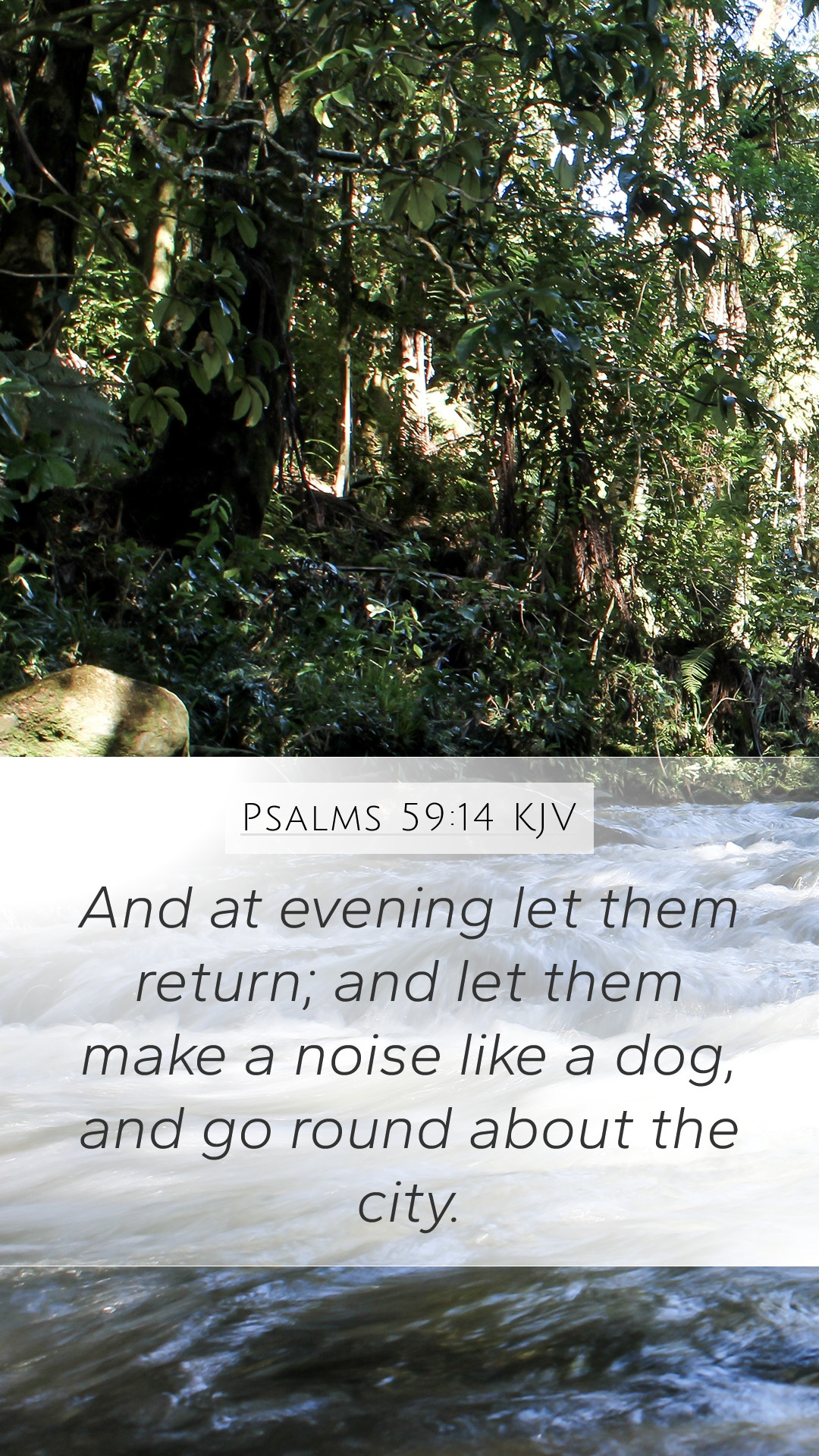Understanding Psalm 59:14
Psalms 59:14: “And at evening let them return; and let them make a noise like a dog, and go round about the city.”
This verse appears within a context of David's lament as he faces opposition and seeks God's deliverance from his enemies. Scholars and commentators have provided various interpretations and insights that help elucidate the meaning of this scripture.
Bible Verse Commentary
The verse can be understood more deeply through the insights of renowned biblical scholars such as Matthew Henry, Albert Barnes, and Adam Clarke.
Matthew Henry's Commentary
Matthew Henry notes that David expresses his disdain for those who would intrude upon his peace and security. The imagery of 'dogs' signifies how the enemies of David preyed upon him, barking and howling as they sought to disrupt his life and draw him into fear. Henry suggests that this metaphor emphasizes the lowliness and base nature of the adversaries he faced, as they return to their nightly prowling, similar to stray dogs. This comparison serves to highlight the relentless harassment of David’s foes, as well as God's eventual deliverance.
Albert Barnes' Notes on the Bible
Albert Barnes expands on the notion of the night-time return of David's enemies, suggesting that their howling serves as a symbol of their wickedness. He argues that the metaphor conveys the idea of relentless pursuit that corrupts what should be a peaceful evening. In his view, this verse captures the cyclical nature of David's distress, portraying a sense of impending danger that falls upon him. Barnes suggests that, while the enemies may return in noise and hostility, God's protection is ever-present, granting David strength amidst adversity.
Adam Clarke's Commentary
Adam Clarke provides a linguistic analysis of the term 'noise' and its implications. He indicates that the term can mean more than just sound; it reflects agitation and chaos brought forth by David’s enemies. His interpretation adds a layer of depth, acknowledging how those who oppose God’s anointed create disorder and unrest. Clarke emphasizes that despite the tumult caused by his enemies, faith in God brings an underlying peace, reassuring believers that God's intervention will come to fruition.
Thematic Meanings and Applications
From these interpretations, several themes arise that extend beyond the immediate textual context:
- Oppression and Perseverance: David’s cry speaks to anyone facing oppression, reminding them that their pain is acknowledged by God. The evening howls of enemies parallel the struggles faced in life.
- Divine Protection: The verse demonstrates the assurance of God’s protection, as David entrusts his troubles to Him while acknowledging the challenges he faces—encouragement for those in distress.
- Hope in Darkness: It emphasizes hope amid turmoil, suggesting that while enemies may seem to prevail, God’s light ultimately overcomes darkness.
Bible Verse Meanings: Contextual Understanding
The historical context of Psalm 59 is critical to understanding its deeper meanings. This psalm likely reflects a moment of crisis in David's life when he was being sought after by King Saul. The imagery of dogs encapsulates the attitudes of hostility and bitterness—a stark reminder of the dangers faced by God’s people throughout history.
Cross References
This verse can be connected with several other Bible passages that explore similar themes:
- Psalm 22:16-18: Reflects on enemies encircling and tormenting, similar to David's distress.
- Psalm 3:1-2: Another expression of David’s enemies and his trust in God amidst trials.
- Philippians 1:28: Encouragement for believers to remain fearless in the face of opposition.
Application to Daily Life
Believers today can reflect on Psalm 59:14 and apply its teachings by:
- Recognizing their own struggles with adversaries, whether literal or figurative.
- Relying on prayer and faith as a means of coping in times of distress.
- Finding comfort in the assurance that God sees and hears their cries for help, just as He did for David.
Conclusion
In conclusion, Psalm 59:14 serves as a poignant reminder of the emotional and spiritual struggles faced by an individual in the midst of oppression. Through the combined insights of historical context, scriptural metaphor, and the wisdom of dedicated commentators, individuals can find profound bible verse meanings that resonate with their personal experiences.


